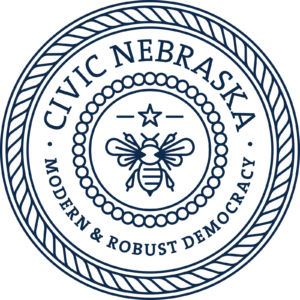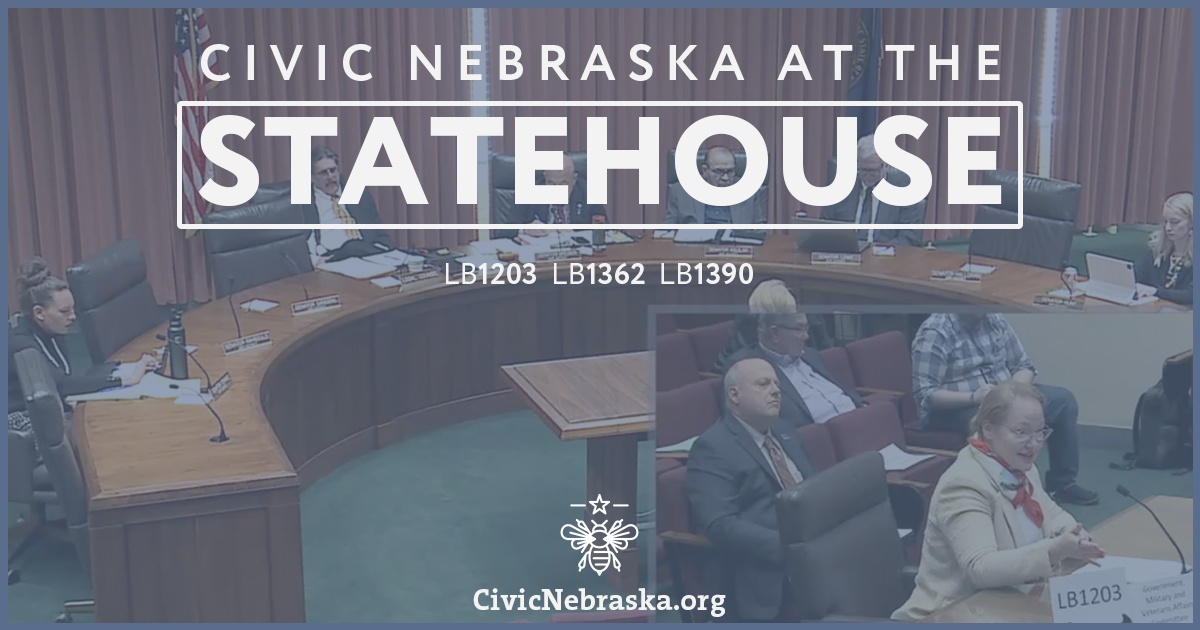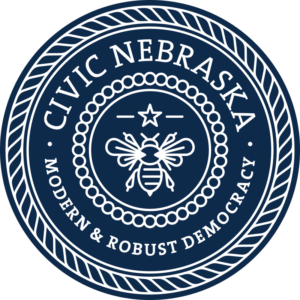LB1203
Heidi Uhing, Director of Public Policy
I’m here to testify in support of State Sen. John Cavanaugh’s LB1203. This is one of two bills this afternoon that deal with the spread of disinformation as it relates to elections. It’s no surprise to anyone here that our media landscape has been flooded for the last several years with falsehoods about elections, creating a landscape where it can be difficult for some voters to determine good information from bad.

Very recently, we have seen swift advances in the capacity of new content creation tools that exacerbate this problem immensely. Media can now be created, very simply and very cheaply, that depicts a person’s likeness or voice so accurately that one cannot distinguish whether or not it is real. It requires a recording of only a few seconds long of a person’s voice or image. This technology is readily used and available to anyone with an internet connection.
Political campaigns have long used criticism, half-truths, and attack ads that depict one’s opponent in a negative light. The electorate has come to expect it. But what is different about this new technology––and why the threat to our elections is so significant––is that a candidate’s campaign could easily make and share audio or video depicting their opponent saying or doing something quite damning that they simply did not say or do.
In response, we are now seeing similar legislation in several states introducing terms new to statute, like deep fakes, synthetic media, and artificial intelligence. These terms refer to the manipulation of existing media depicting a person, without their permission, in a way that is simply fabricated. In the case of a political opponent, there is ample audio and video of them on the internet to choose to manipulate, and doing so can be of great benefit to a candidate’s political campaign. It could win an election.
To remove the temptation to use these tools to mislead voters and to protect the integrity of our elections, LB1203 would put guardrails around the use of this technology by requiring disclosures on campaign ads manipulated using artificial intelligence. This would help voters have a chance at basing their impressions of a candidate and their policies on real, actual events.
The success of our democracy is dependent upon an informed electorate that has access to true and accurate information on which to base their votes. We are approaching a time when truth is going to be harder to discern, and we are all going to have to get a lot more savvy in our media use to make good decisions for ourselves, our families, and our communities. This bill would help make voters aware that they are viewing manipulated campaign materials and let them make their decisions on the ballot accordingly. We urge the committee to support LB1203.
LB1390 and LB1262
Heidi Uhing, Director of Public Policy
I’m here to testify in support of State Sen. Eliot Bostar’s LB1390 and State Sen. Jen Day’s LB1262.
LB1262 calls for a study from the Commission on Indian Affairs of barriers to voting for Native peoples in Nebraska and for the report to provide policy recommendations the Legislature could consider to address them.
The White House released a lengthy report in 2022 that looked into voting barriers nationally, and many of their recommendations could be considered here. An important one was for states to accept tribal IDs for voting purposes, which this committee incorporated into last year’s bill, so we are grateful for that. Several other states with Native populations have already implemented other recommendations, including Colorado, Montana, Nevada, New Mexico, Washington, and Wyoming. I hope you will support this opportunity to delve into the barriers unique to Nebraska.
As for LB1390, this is a bill that addresses some of the top concerns for election integrity in recent years. It would do this by:
›› extending penalties currently in place for interfering with deputy registrars to include threats and harassment of all election officials and workers;
›› creating penalties for doxing election officials, or sharing their home addresses online;
›› creating penalties for making artificial intelligence-generated, hyper-realistic “deep fake” video or audio depicting an election official with the intent of distributing misinformation about an election; and
›› requiring the Secretary of State to provide a report of these instances to the Legislature.
When Arizona’s Secretary of State testified before the Senate committee last November on losing a dozen top election officials since 2020, he said: “Many veteran Arizona officials from both political parties … have left the profession for the sake of their own physical, mental and emotional health and that of their families. The cost of persistent misrepresentations about the integrity of our elections is high, but the cost of inaction against those threats is higher.”
The Brennan Center found that 12 percent of local election officials began their service after the 2020 election cycle. Another 11 percent of current officials say they are very or somewhat likely to leave before November 2024. If these officials follow through and exit their positions, we will have lost approximately 1.5 election officials per day between the November 2020 and 2024 elections. We can expect more than one in five to be serving in their first presidential election in 2024.
Recruiting and retaining poll workers has long been a challenge in Nebraska for both urban and rural counties. In this new contentious environment, when they must be concerned for their safety, it is particularly difficult. High turnover in all these positions increases the likelihood that election workers could make errors, which would fuel perceptions that workers are seeking to change the outcome of the election, further eroding the public trust in our electoral process.
For our elections to remain accurate and secure, we need experts who conduct them to feel safe continuing to do this work. Just since 2022, 14 states have responded by creating new protections and penalties for threats to election officials. Given how contentious the 2024 election is shaping up to be, it would serve Nebraska well to have guideposts in place. Thanks for your consideration. We urge you to advance both of these bills to the floor.
LB1382
Adam Morfeld, Executive Director and Founder
I am the executive director and founder of Civic Nebraska, here today to testify in opposition to LB1382. The root of our opposition to LB1382 is it further inhibits the practical ability of Nebraskans to have their voice heard through the petition/initiative process, which is already unpredictable, expensive, and an enormous undertaking for any Nebraskan. The United States Supreme Court and the Nebraska Supreme Court have both found that the initiative petition process is a core constitutional right under the First Amendment and Article 1, Section 5 of our constitution, and it is Civic Nebraska’s firm belief that it should have as few barriers as possible to participate in. LB1382 would enact unnecessary barriers to that fundamental right.

It is no secret that qualifying a ballot initiative is no small task. Some initiatives have tried and failed several times before even making it on the ballot. Medical Marijuana and casino gaming are two prominent and recent examples. It was only after multiple attempts that casino gaming was authorized in our constitution and our statutes, and medical marijuana is still on its third attempt despite a massive grassroots campaign and support.
Any ballot initiative requires a significant amount of people both paid and volunteer, to collect the requisite number of signatures to qualify it. Paying per signature not only incentivizes efficiency but it also provides predictability for the Nebraskans organizing the ballot initiative in terms of cost and budget. It will be much more unpredictable, more expensive, and burdensome to eliminate this option for Nebraskans.
Perhaps the irony of this legislation is that on one hand, this portion of the legislation would create inequity by driving up the costs of the initiative process in a manner that favors Nebraskans with resources, but the second part of the legislation then restricts Nebraskans’ ability to raise that additional money needed to address and overcome this.
As the general consultant for the 2020 casino gaming initiative, a large part of my firm’s role was quality control. We would go to where our contracted signature collectors are located and make sure they are using the right petition sheets and saying the object statements. We honestly never had any issues there.
Overwhelmingly, the real issue we ran into is that voters who signed were mistaken as to which county they were registered in, or that they were registered to vote at all. When doing post-signature audits we would find that a Sarpy County voter signed a Douglas County petition or vice versa, or that they simply had not reregistered since they moved from a different county, but they thought they had.
Further, collectors do not cut corners because there is almost always an opposition campaign attempting to film them, people hired by the campaign like me to do quality control, or well-informed voters who know the rules and will report them if they violate the rules, and they know it.
Per-signature payment ensures that collectors are efficient, and it also incentivizes the leaders of an initiative to hold them to a high standard and ensure quality control. A good collector can collect dozens of signatures in an hour in a high-volume location and around 80 percent of those signatures should be valid signatures, with the other 20 percent being voters who simply were registered to vote in the correct county as discussed previously.
Finally, regarding the limitation on who or what entity can donate over $20,000, aside from the constitutional concerns that I am sure the ACLU will discuss in depth, it is incredibly expensive to run an initiative petition campaign in the state of Nebraska due to our expansive geography and the county distribution requirement.
Even with a massive volunteer signature collector base as we see in the medical marijuana campaign, it still costs at least several hundred thousand dollars to focus on bulk collection or collection in the smaller counties or a combination of the two. The medical marijuana campaign has seen this firsthand. We should not inhibit Nebraskans’ ability to further fundraise to support their constitutional right to engage in the initiative petition process.
Ultimately, Nebraskans will be the judge of whether the campaign’s sources of financial support and funding merit their support of their initiative at the ballot box. For those reasons, we ask that you do not advance LB1382 to General File.



